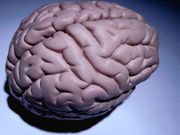Complications seen after median of 5.5 cycles of anti-PD-1-inhibitors; include myopathy, neuropathies
MONDAY, Sept. 11, 2017 (HealthDay News) — Neurological complications associated with anti-programmed death 1 (PD-1) antibody treatment have a diverse phenotype, according to a study published online Sept. 5 in JAMA Neurology.
Justin C. Kao, M.B.Ch.B., from the Mayo Clinic in Rochester, Minnesota, and colleagues conducted a retrospective cohort study involving patients with development of neurological symptoms within 12 months of receiving anti-PD-1 therapy.
The researchers found that 2.9 percent of the 347 patients treated with anti-PD-1 monoclonal antibodies developed subacute onset of neurological complications. Seven of these patients received pembrolizumab and three nivolumab. Neurological complications occurred after a median of 5.5 anti-PD-1 inhibitor cycles. Myopathy, varied neuropathies, cerebellar ataxia, autoimmune retinopathy, bilateral internuclear ophthalmoplegia, and headache were reported complications. Reported peripheral neuropathies were axonal and demyelinating polyradiculoneuropathies, length-dependent neuropathies, and asymmetric vasculitic neuropathy.
“Neurological adverse events associated with anti-PD-1 therapy have a diverse phenotype, with more frequent neuromuscular complications,” the authors write. “Prompt recognition and discontinuation of anti-PD-1 therapy is recommended. In some cases, immune rescue treatment may be required.”
One author disclosed financial ties to the pharmaceutical industry.
Copyright © 2017 HealthDay. All rights reserved.








